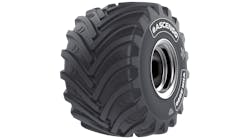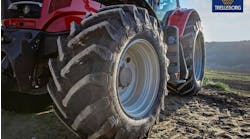Yokohama Tire Corp.’s (YTC) West Point, Miss., medium truck tire plant will continue to play a critical role in the company’s growth.
The one million-square-foot plant, which began production in October 2015, is on track to manufacture nearly 810,000 medium truck tires this year “and we’re setting a target for 840,000 (units) next year,” Jeff Barna, CEO and president of YTC, revealed during a recent open house event that marked the 10th anniversary of the factory’s groundbreaking.
Without the Mississippi plant, “YRC and (parent company) Yokohama Rubber Co. Ltd. would be nowhere near the level of success we’ve achieved,” said Barna. “And the plant is still in its infancy.”
Commercial medium truck tire sales currently make up around 20% of YTC’s revenue in North America. That percentage “increased since the plant arrived,” said Barna, who verified that more than 90% of the tires made at the plant are sold in the United States. “Prior to the Mississippi plant, being reliant exclusively on off-shore production made it difficult to really capitalize on market opportunities. Now, with the plant being here and its responsiveness, we can reduce inventory levels and increase speed to market.
“We’re actually in pursuit of new business. Before the plant, it was an allocation type of environment. We had to be very specific about who we did business with, without addressing incremental growth opportunities.” (Prior to the Mississippi plant, most of the truck tires YTC sold in the U.S. were imported from Yokohama Rubber’s commercial truck tire plant in Japan. Yokohama Rubber’s third medium truck tire plant is located in Thailand.)
The Mississippi plant manufactures the following Yokohama brand truck tires -109L, RT617, 715R, RY023, 709ZL, 109R, TY517, 712L, 504C and 114R – and produces more than 40 SKUs across five sizes: 11R22.5, 295/75R22.5, 11R24.5, 285/75R24.5 and 255/70R22.5.
The factory’s highly targeted size range is by design, according to Barna. “When you talk about a plant being in its infancy, one thing you want to do is to try to feed it long-run production SKUs. By identifying the high runners, (you) can make sure the plant can operate as efficiently as possible. That was important to us.
“I would say, however, that we’ve gone from a very limited number of SKUs – I would say 14 to 15 – to now comfortably producing” many more, “so there’s more diversity, in terms of production, than ever. Part of what I like about Yokohama is our agility,” which he called “a byproduct” of the company’s size.
“We compete against giants and when you think about us as being a $1.5 billion to $2 billion company here in North America, we have the ability to pivot quickly with any turn of the environment, customer make-up and the economic scenario of the moment. That’s kind of our superpower right now – being light on our feet and highly agile.”
At the moment, capital investments at the Mississippi plant “are spread widely, but I wouldn’t call them major,” noted Barna, who added that the facility is still in its first phase of development. “I think there’s another 10% to 15% of additional headroom, in terms of capacity. I think we could get into the mid-800,000s (and) maybe even close to 900,000” tires produced there each year.
“At that point, we’ll need to start talking about whether we need to investigate phase two and bring the bulldozers out again. But I think that’s a two- to three-year horizon.” (By contrast, during 2021, the plant produced around 625,000 truck tires.)
According to Barna, “a lot” of the facility’s potential “is being unlocked because of the culture finally coming together. We’ve been able to inject new leaders and kind of rebuild the team and we’re really seeing good things in terms of (the plant’s) culture helping us achieve better standards in the way of production. And as production levels have increased, we’re seeing a lot of progress in our cost-per-unit.”
“I love the level of flexibility we have” at the plant, Stan Chandgie, YTC executive vice president of sales, told MTD. “We work closely” with the plant’s management team - led by Phillip Calhoun, vice president of manufacturing - “in terms of product planning and making sure we have the right processes in place. Our fill rates have been very good.”
Demand ‘picking up’
YTC’s medium truck tire orders “are picking up,” Barna told MTD. “But it’s still a grind. You still have to go out there and earn it. I think that based on informal projections, we’ll outperform” the U.S. Tire Manufacturers Association’s medium truck tire shipment predictions for 2023. “This year, we started out slowly. A lot of our biggest customers were super-high on inventory. We’re now seeing a better balance between demand and supply.”
“I go back to the quality of our SKU mix – paired with volume - (which) has enabled us to not only make more, but also make the right products to meet our commercial servicing dealers’ needs,” said Chandgie. “We’re making tires that are needed in the moment for both fleets and our partner dealers.
“We rely heavily on our dealers. Our job is to work closely with them to understand what their needs are as they expand and then respond as quickly as we can to fulfill those. We’ve seen an uptick in (sell-in) already start to happen.”
The medium truck tire segment will continue to display volatility, “but if you’re an agile company and you embrace that volatility, you can treat this as an opportunity to win," said Barna. “The (Mississippi) plant is performing. The products are great. Our brand resonates with the end user. It’s shaping up to be another promising year.”




